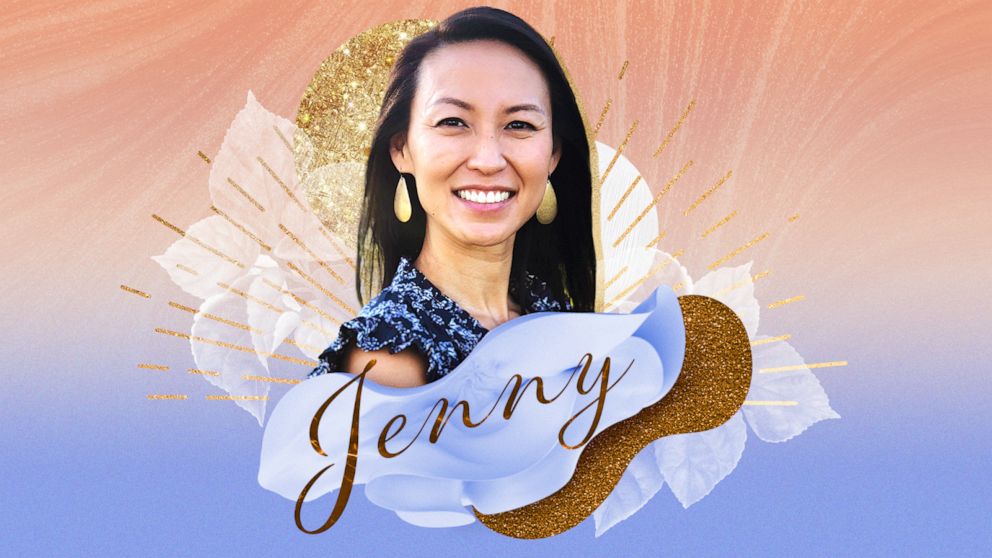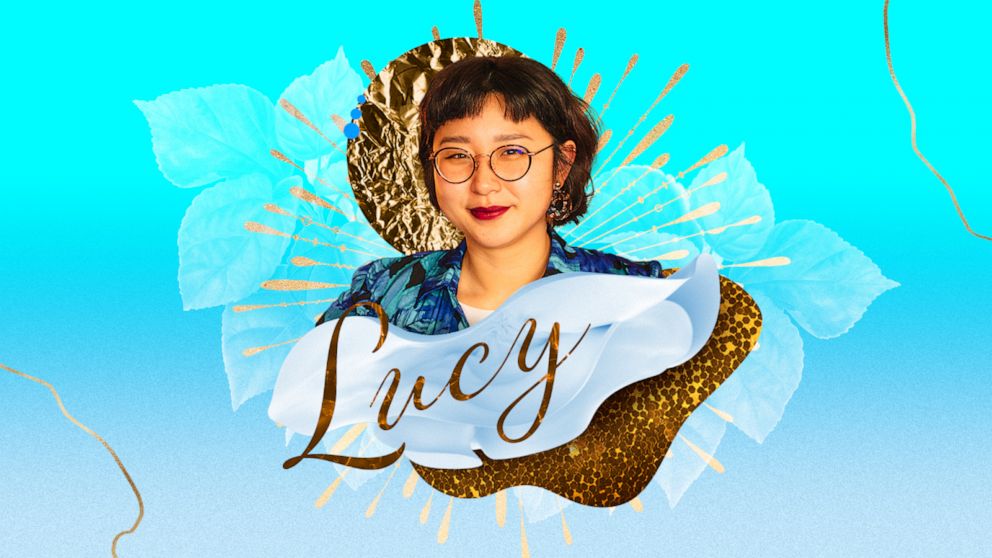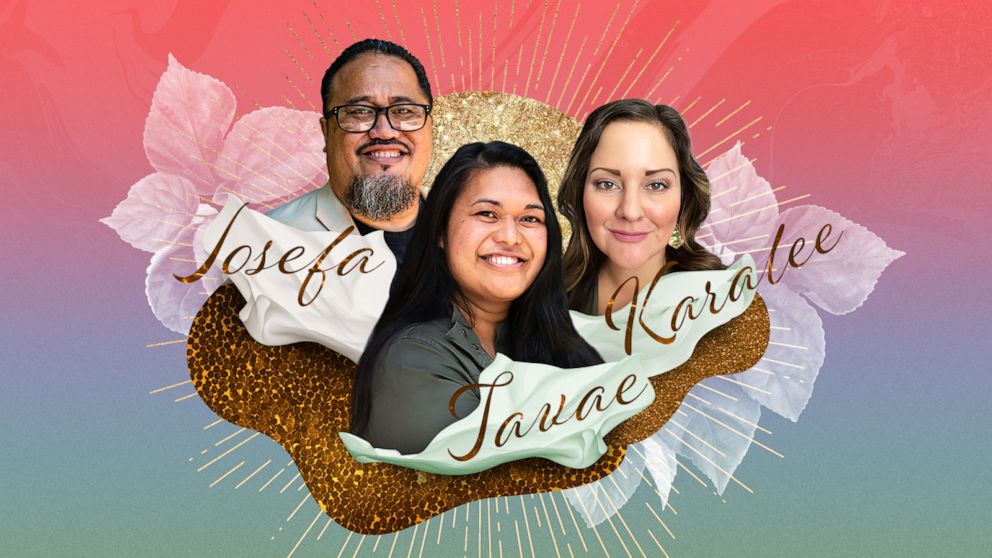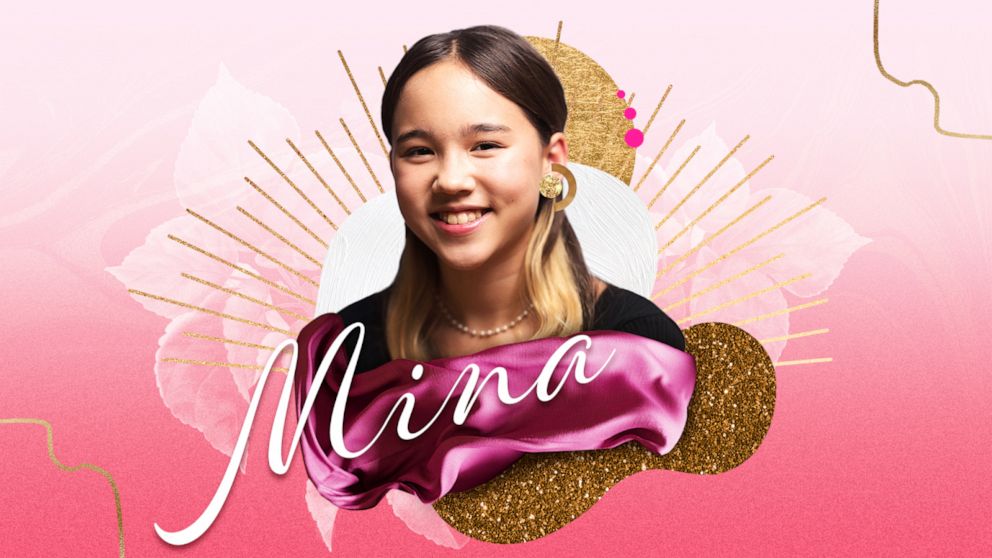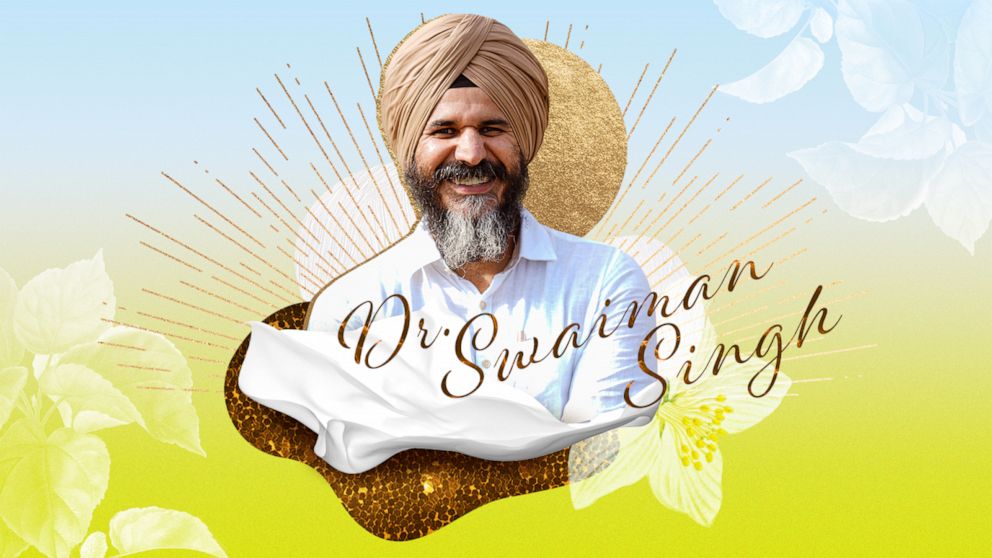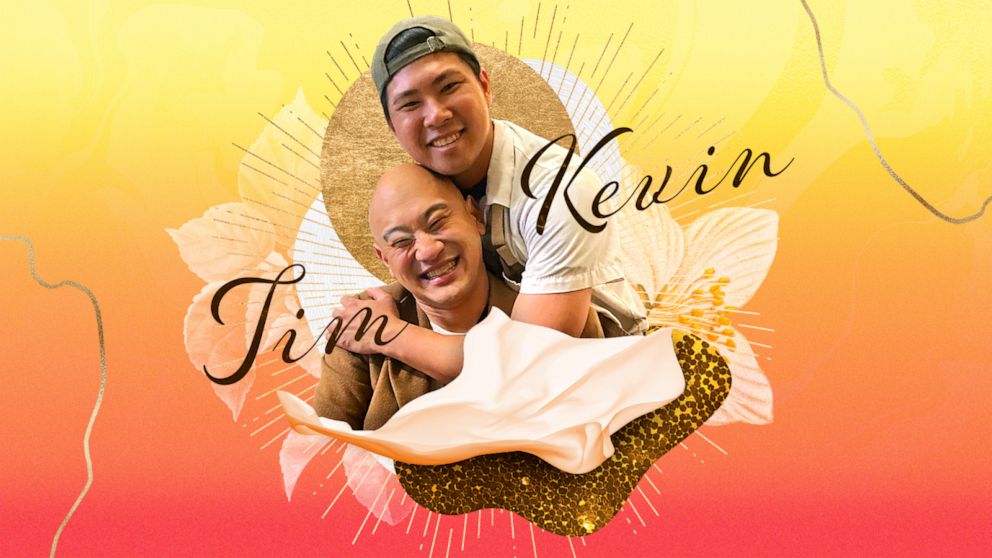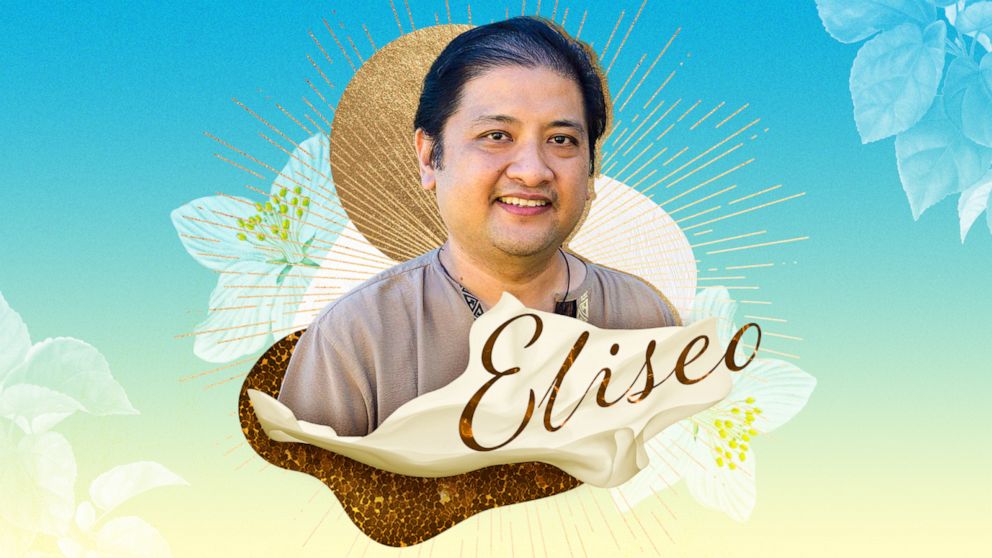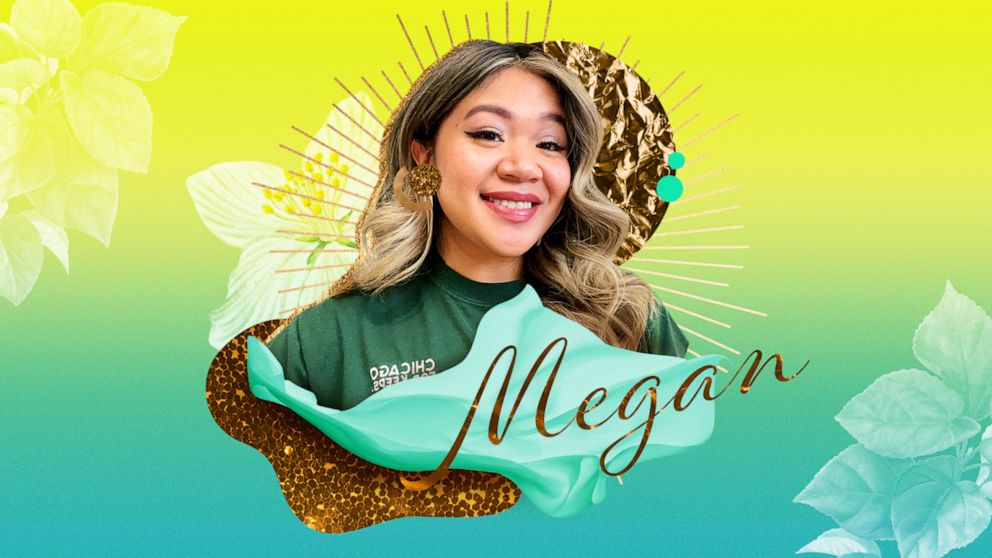The Asian American, Native Hawaiian and Pacific Islander community in the U.S. is diverse and woven together by rich traditions, food, languages, cultures and religions from within a global diaspora.
As the U.S. recognizes Asian American, Native Hawaiian and Pacific Islander Heritage Month amid a rise of violence and attacks, the AANHPI community has taken a stand for a more equitable, secure and inclusive society.
These individuals are doing the work day in and day out, and making it their mission to create a positive impact in the world, and this May, “Good Morning America” is honoring 14 changemakers with spots on the GMA Inspiration List.
Our list ranges from medical professionals on the front lines, to bakers, artists and more -- all of whom are passionate about AANHPI representation and empowerment, and have devoted their lives to uplifting, inspiring and creating a safe space for others in unique ways.
Ahead, meet the changemakers on "Good Morning America’s" 2022 Asian American Native Hawaiian Pacific Islander Inspiration List.
Reclaiming mental health for the Asian American community
In the last few years, Jenny Tzu-Mei Wang has emerged at the forefront of the mental health space for Asian Americans.
The licensed psychologist leads a private practice in Houston, and though she didn’t focus solely on treating Asian Americans at the outset, her priorities have since changed.
Wang told "Good Morning America" that she had noticed more individuals in the Asian American community seeking out mental health care amid the pandemic and pivoted to meet their needs. Today, she estimates up to 85% of her clientele are Asian Americans or people of color.
Wang started the @asiansformentalhealth Instagram page in September 2019 to raise awareness of mental health issues from a cultural perspective and published an online companion directory of AAPI therapists across the country. The Instagram page "became a second space in which I was able to share themes or struggles that arise for Asian diaspora communities, and also encourage people to start just thinking about these things," she said.
The account also served to amplify a topic thats still stigmatized and considered taboo in some Asian and Asian American communities.
Wang has since expanded the social media account into a new book, "Permission to Come Home: Reclaiming Mental Health as Asian Americans," which was released earlier in May.
"My hope is that people will use the book in book clubs, in work settings in communities, and really start to explore these themes which often can feel like roadblocks, can make people feel really stuck, and also to destigmatize mental health for our community," she said.
Being named on the 2022 Inspiration List is a recognition that’s not lost on her. "I'm just so honored to be able to be alongside all of these Asian American, Pacific Islander and Native Hawaiian creators and movers and shakers in our community and that gives me hope for where we're headed next," she said.
"It means that now, I am given an opportunity to uplift others who are also doing this work, and to use whatever visibility might be available to me to really collaborate and bring others along as well."
Baker builds global Asian baking community
Kat Lieu is inspiring thousands -- from pastry chefs to home cooks alike -- to "bake the Asian way."
Lieu, author of “Modern Asian Baking at Home,” is the founder of Subtle Asian Baking, an inclusive and diverse global group of bakers born on social media during the early days of the pandemic. With businesses shuttered, bakeries at a standstill and much of the public only leaving their homes for essentials, Lieu said she "had to start baking this Asian way" in order to have goodies like egg tarts, milk breads and more at home.
“I wanted to bounce ideas off of other bakers who were nostalgic for these foods too that brought them comfort [and] who wanted to bake this way. I didn't see a collective community or network or space – and ‘subtle Asian’ communities are so big online now,” Lieu said.
“There was no subtle Asian baking, so that’s just how it started, I put it into Facebook, invited 100 of my closest friends and from that point on it just blew up.”
The group now has 144,700 members on Facebook with a daily reach of 100,000 members, plus, an additional reach of 13 million on Instagram.
“I never expected it to become this amazing network. It's much bigger than I anticipated,” Lieu said. “You don't have to be Asian to bake the Asian way."
Her growing community has inspired bakers across the world and stretched conversations across social media platforms and group chats.
It also gives back. Lieu has organized global bake sales to raise money for charities fighting Asian hate and most recently to support the World Central Kitchen’s efforts in Ukraine.
Lieu sees the group as “a movement and culinary innovation,” because it combines “traditional recipes from our culture diaspora in America,” as well as “recipes from way back, passed down from our ancestors,” like her Vietnamese grandmother’s cake that she learned from her parents’ restaurant.
Bookstore puts Asian American voices front and center
Nestled in New York City’s Chinatown is a cozy spot for visitors to grab a cup of joe, peruse the wall of books for a new read and curl up in a comfy chair.
That place is Yu and Me Books, and the person behind it all is 27-year-old Lucy Yu.
Yu and Me Books is unique when compared to other stores. The shop puts Asian American, Native Hawaiian and Pacific Islander voices front and center with a curated collection of books from AANHPI authors.
“It was really important for me to create this bookstore because I always wanted to see my story represented, my family’s story represented, and in a way that I never saw in bookstores growing up, or in bookstores at all,” Yu told “Good Morning America.”
Yu, a chemical engineer, launched Yu and Me Books in December 2021 amid the height of the delta and omicron coronavirus variants. Despite the circumstances, there was a line out the door on opening day.
“Everyone came up to the counter and shared how much it meant for them to see [themselves] represented on the shelves in a way that they haven’t seen before,” she said. “So every day, I’d hear a wonderful story about someone that connects with a story that I have on my shelf, and that’s just beyond what I ever expected for the store.”
Yu added that she hopes her bookshop becomes something of a safe space for customers.
"I just would love for everyone to come into Yu and Me Books and find a home,” she said. “I hope that you feel safe and secure and that the store gives you a big hug when you enter."
Fighting for space for the Pacific Islander community to be 'seen and heard'
Empowering Pacific Islander Communities, or EPIC, is a national advocacy group that was started in 2009 by a group of Pacific Islander leaders to address the needs of their respective communities.
Founded by Karalee Vaughn, Iosefa Aina, and several other civic leaders, the organization, which is based in Los Angeles, aims to highlight glaring gaps in NHPI representation and advocate for those overlooked groups.
“A lot of times we’re lumped together as Asian Pacific Islanders, and then you kind of lose … the nuance of the community," Aina told "Good Morning America."
EPIC works to empower the NHPI community through research, civic engagement -- such as encouraging people to vote and to get involved with the census -- and by opening up a dialogue with legislators to propose policies that would help them.
“Our advocacy is about building political power, so that critical policy decisions are not made without us,” Tavae Samuelu, the group’s executive director, told “GMA."
Leadership development was also extremely important to EPIC’s founders.
One of the group’s most promising programs, according to Samuelu and Aina, is the Pacific Islander Leaders of Tomorrow (PILOT) program, which hosts sessions throughout the year intended to foster the growth of new leaders in the Pacific Islander community.
“[Young people] are leading now at every moment. They’re making decisions that improve and make our communities better,” Samuelu said.
Above all, EPIC's main mission is to ensure the Pacific Islander community is seen, heard and protected.
“EPIC exists to challenge and address and end the specific ways that racism manifests itself in the [Asian Pacific Islander] community,” Samuelu said, pointing to “severe health disparities and economic precarity” as some of the most immediate threats.
“How we often see ourselves is usually through the consumption of our land, our bodies and our cultures with very little protection for our people … and so the question to present to folks is, ‘How are you participating in the protection of our communities?’”
Cultural exploitation of PI groups is not a new problem. EPIC co-chair and co-founder Karalee Vaughn said it’s important to recognize that the Pacific Islander community had “a vast rich history prior to contact and colonization.”
“We no longer want to be categorized as an asterisk or told we are not significant enough to be recognized,” she said.
Student on a mission to teach AAPI history and culture in schools
Fourteen-year-old Mina Fedor was in seventh grade in 2020 when violence against the Asian American Pacific Islander community began to spike.
Instead of retreating, she decided to push back against the attacks and the depressing headlines they generated by creating something "hopeful."
What started as a seed of an idea -- a rally and march in Berkley, California, intended to spread “positive” messages and speak out against anti-AAPI hate -- ultimately grew into 1,200 person-strong event, attended by a number of Berkeley City council members and several other local activist groups.
Not long after the rally, AAPI Youth Rising was born.
Fedor, who is biracial and the daughter of immigrants, joined forces with a group of fellow middle school students to bring the organization to life. Their focus: to increase AAPI education and culture in school curriculum.
Among the group’s initiatives is the ONE/180 pledge, which pushes schools to dedicate at least one day to teaching AAPI-focused lessons for every 180-day school year.
Fedor, a finalist for Time magazine’s 2021 kid of the year who credits her family for instilling in her the importance of activism, said education is one of the best ways to fight harmful stereotypes about the AAPI community, such as the idea of them being “perpetual foreigners.”
“Education is the key to fighting racism and fighting stereotypes and misinformation,” Fedor told ABC News.
“Asian Americans have been here for generations,” Fedor said. “America is built on immigrants so why are you calling us foreign? If you don’t learn about Asians’ history in America, then that belief perpetuates itself.”
Doctor working to improve lives in Asia and beyond
Dr. Swaiman Singh is a trained cardiologist and the founder and president of 5 Rivers Heart Association, a public charity dedicated to improving health care for people living in underserved communities.
5 Rivers first was launched around 2010, formally becoming an NGO, or non-governmental organization, in 2018. In the last decade, it has focused its efforts in Singh’s native India, primarily in the country’s northern region, with the hopes of expanding into communities around the globe, including in the U.S.
“In India, we have a project that basically works for better health care, and improving sports infrastructure and education in Punjab,” Singh, 35, told “Good Morning America.”
The group’s primary goal, he said, is to ensure “cost-effective, equal health care for all.”
Singh, who immigrated to the U.S. in 1997 and is now based in New Jersey, plans on bringing 5 Rivers’ vital work to other countries, including Ghana next year. From March to May 2022, 5 Rivers also supported individuals in Ukraine, providing telemedicine services with a team of 70 doctors, according to Singh.
In addition to his medical and philanthropic work, Singh stays connected with Indian American community groups in the U.S. through the guest lecture circuit. He hopes to show young people how he, a Sikh American, South Asian immigrant, found his footing and built a successful life regardless of his background and the hurdles he faced.
“One thing I always want to do is to say, ‘Hey, you can do it, even if you're an immigrant,’” he said. “‘Yeah, your situation might not be so great, but America really gives you a chance to work. And if you work hard enough, you can achieve any goals.’”
Advocate and podcaster shines a spotlight on girls and AANHPI youth
Stephanie Hu, 18, is still a student in high school, but she’s already using her talents to empower other young people and uplift fellow Asian American Native Hawaiian Pacific Islanders in myriad ways.
Hu started the “Dear Asian Girl” podcast at the very beginning of the COVID-19 pandemic, hoping to “build a sense of community” while in quarantine.
“It was founded really as a passion project of mine. I was feeling really isolated and my parents also live in China so they were, you know, across the world,” Hu said.
“I think I really just wanted a sense of community, especially after seeing a lot of the disheartening news and violence against AAPI people in the U.S.”.
Hu said the podcast originally started out as a small poetry blog titled “Dear Asian Youth,” but eventually expanded into a larger organization with “Dear Asian Girl” at the forefront.
“I just wanted to have that space to uplift Asian women from all walks of life and really spotlight their stories,” she said.
With 180 chapters across 18 countries and more than 100,000 followers on its various social platforms, Dear Asian Youth works to spread educational content and give other AAPI people a place to congregate and share stories, Hu said.
The group also hosts a number of virtual events, promotes AANHPI voices in literature, and encourages activism and civic engagement in marginalized communities.
“We wanted Asian girls across the world to tune in to this platform and not feel lonely and really feel like their stories were being represented,” she said. “We really wanted people to relate to the narratives while also feeling inspired.”
The podcast itself, still the centerpiece of the organization, covers a wide range of topics from politics and relationships to much tougher areas such as the turmoil Asian women face when it comes to gender and race. But Hu said it’s the episodes where they highlight “moments of joy and culture” that makes it all worthwhile.
“It’s sort of amazing when we are able to kind of come together in our activism and have these deep conversations,” Hu said. “We are able to find so many common points that we’re able to relate upon, and connect different parts of our experiences and say ‘hey, I’ve been at the exact place that you've been in before’ even though maybe we've never even seen each other in person.”
Although Hu said she hasn’t seen her parents in almost two years she knows they are proud of her work.
“More than anything, I think they're glad that I have connected to so many other Asian women across the globe and was able to define my own voice,” she said.
Hu will bring “Dear Asian Girl” with her in the fall when she attends Harvard, and plans to continue her work on different advocacy issues.
Chefs combat AAPI hate with the power of food
When attacks against Asian-Americans in the U.S. spiked at the height of the pandemic, chefs Kevin Tien and Tim Ma cooked up an idea to combat hate with hospitality.
In spring 2021, the duo started a donation-based dinner series in Washington, D.C., called Chefs Stopping AAPI Hate, as a way to fight back with food.
“Me and Kevin and a few other Asian American chefs in D.C., middle of the pandemic, the only thing we could really do was these takeout dinners,” Ma said. “We're like, OK. Five chefs, five courses. Let's do a dinner. And it sold out immediately. And then it just kind of snowballed from there.”
In the past year, Chefs Stopping AAPI Hate has raised nearly $500,000 and the group has expanded to New York, Detroit and San Francisco. It has also pivoted to support causes as needs arise, such as hosting benefit dinners to help Ukrainian refugees.
Tien, best known for the Cajun-infused Vietnamese dishes he serves up at his restaurant in the district, Moon Rabbit, described food as a “gateway into learning about someone's family, their history, [and] their culture.”
For Ma, founder of the Arlington, Virginia-based Lucky Danger, the resurgence of attacks on AAPI communities evoked memories of growing up in Arkansas, where his parents owned the only Chinese restaurant in town, and Ma often felt he didn’t belong.
“It was more us thinking about the older generation, because that's who you saw in the videos,” Ma said, referencing the spate of violence against older Asians and Asian Americans as a primary driver of the charity dinner concept. “That looks like my mom, that looks like my grandfather.”
“Growing up, it's always like, keep your head down, don't let things bother you. Ignore everything and brush it to the side,” Tien added. “I think years and years of brushing it to the side, I think a lot of people think you can, like, take advantage or talk down to the Asian community or never think they'll speak up.”
The creation of Chefs Stopping AAPI Hate is working to undo all of that, spreading awareness of anti-AAPI violence and raising funds for other organizations to combat discrimination.
Artist showcases Filipino culture through his craft
Eliseo Silva has been carving out his own spot in the art world for years, infusing his culture and heritage into his work and helping to define what Filipino art is and can be.
In 1989, Silva, now 50, moved to the U.S. and attended Otis College of Art and Design in Los Angeles. When a professor there told him that there was no such thing as Filipino art, he set out on a decades-long mission to define it and to showcase the Philippines’ rich history.
In the years that followed, Silva created various murals and artworks depicting Filipino culture, including important figures from Filipino history, such as the country’s national hero, political activist and writer José Rizal, and Filipino American labor organizer Larry Itliong. Many of Silva’s murals were scattered around Southern California, as well as in Sacramento, Seattle, and Philadelphia.
Silvio most recently added a new work to Los Angeles’ Historic Filipinotown neighborhood.
The 30-foot tall, 82-foot wide gateway is intended to represent the Filipino American community and spans Beverly Boulevard at the entrance to the neighborhood. The installation is named “Talang Gabay - Our Guiding Star,” and features numerous aspects of Filipino culture, including a parol, a star-shaped lantern seen around the holidays in many Filipino households, and mythological figures in Philippine folklore.
The design also incorporates a Gumamela flower, or hibiscus, which was intended as a tribute to workers on the frontline of the pandemic, Silva said in 2020.
“It's a fitting tribute to the many courageous men and women on the frontlines, brave warriors such as our numerous Filipino healthcare workers," he said, after his design was first revealed. "The gateway not only signals that Filipino Americans have finally arrived, it also symbolizes the valor of the frontliners in our city."
Non-profit director works to empower LGBTQ Asians and Pacific Islanders
Kenrick Ross (he/him), executive director of the National Queer Asian Pacific Islander Alliance, is part of the “Good Morning America” AANHPI Heritage Month Inspiration List for his dedication to empowering LGBTQ Asians and Pacific Islanders.
The 42-year-old Newark, New Jersey, resident is the second executive director in the group’s history. The organization was created in 2005 to bring small groups of queer and trans Asian Pacific Islanders together on a national level, and to provide resources for grassroots organizing efforts.
As executive director, Ross works tirelessly on policy advocacy for the LGTBQ community on issues such as immigration, voting rights and trans and reproductive rights.
He also fights to ensure LGTBQ AAPI people are represented in research and resource development for their communities.
“Every day, we work to make queer and trans AAPI communities more inclusive and more reflective of that diversity,” Ross said.
“Sometimes you have an image of what AAPI communities are, [but] we are much more diverse than that,” he added. “Caribbean communities, Black, Asian communities, Pacific Islander communities, AAPI's living with HIV, seniors, lower income folks -- we want to make sure that we're reflecting all those people.”
Ross’s ultimate goal for the organization is to enable LGBTQ AANHPI people to be fully seen and empowered within their communities.
“So many of us have had to not be ourselves in larger communities,” Ross said. “[I hope] in all the communities we call home, that we are empowered to be visible, and not just to be visible, that we’re empowered to speak and lead and contribute and serve in all those communities -- because that has not always been the case.”
Filipino-American clothing designer, small biz owner gives back to Chicago nonprofits
Filipino-American entrepreneur Meghan Banias, a Chicago native, is using her clothing business to give back to charities that uplift Black and brown communities in the Windy City.
Banias is the founder of the family-run Chicago For Keeps. She creates embroidered apparel and accessories and donates a portion of the proceeds from each collection to benefit local nonprofit organizations, incorporating nods to her Filipino heritage in all her designs.
Banias and her mom Lucy embroider the pieces at home by hand and sell them online or at pop-up events. Banias said they’re proud to have donated close to $7,000 over the last two years to various Chicago organizations, including Taste for the Homeless, which prepares hot meals for the unhoused people on the south and west side of Chicago.
Banais said she’s grateful to have the ability to use her skills and creativity to make Chicago a better place for all communities, and believes strongly in the importance of allyship.
“Creating an impact isn’t waking up and expecting to do something big, it’s about waking up every day knowing that you are choosing to make a lot of small efforts every day to create something big over time,” she said.
ABC News’ Elisa Tang, Rebecca Anderson, Caterina Andreano, Angeline Bernabe, Chris Cirillo, Suzanne Dacunto, Asher May-Corsini, Joel Lyons, Kelly McCarthy, Shannon Mclellan, JaJuan MorrisGuity, Tony Morrison, Donald Pearsall, Melanie Schmitz, Lauren Sher, Nidhi Singh, Andrew Van Wickler, Ivory Ward, Yi-Jin Yu, Phaedra Singelis, Jeff Swartz, and Radhika Chalasani. Special thanks to the Disney AANHPI BERG and Asian American Storytellers groups.
